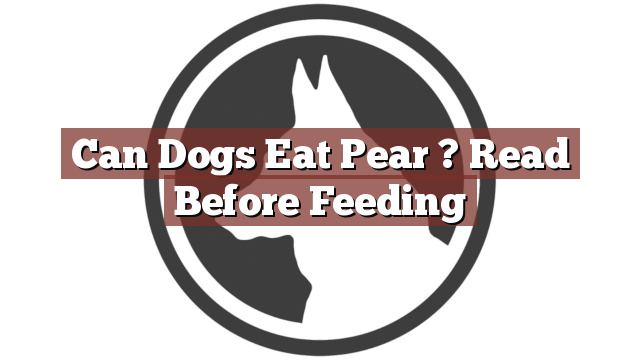Understanding Your Dog’s Dietary Needs
As a responsible pet owner, it is important to understand your dog’s dietary needs to ensure they stay healthy and happy. While dogs primarily thrive on a diet of meat, they can also benefit from some fruits and vegetables in moderation. However, it is crucial to be aware of which foods are safe for dogs to consume and which ones can be harmful. One such fruit that often raises questions is the pear. Let’s explore whether dogs can eat pears and the factors to consider before feeding them to your furry friend.
Can Dogs Eat Pear? Read Before Feeding
Can dogs eat pear? This is a common question that many pet owners have, and the answer is yes. Pears are generally safe for dogs to eat, but there are a few things to keep in mind. It is important to feed pears to your dog in moderation and in small portions. While pears are a rich source of vitamins and minerals, they are also high in natural sugars. Feeding your dog too many pears can lead to an upset stomach or diarrhea.
When feeding pears to your dog, it is important to remove the seeds and core. These parts can be a choking hazard and may contain trace amounts of cyanide, which can be toxic to dogs. Additionally, pears should be given to dogs in their natural form, without any added sugars or seasonings. Avoid feeding your dog canned pears, as they often contain high amounts of sugar and preservatives that can be harmful to their health.
Pros and Cons of Feeding Pear to Your Dog
Feeding pears to your dog can have several benefits. Pears are a great source of vitamins A and C, as well as fiber, which can aid in digestion. The high water content in pears can also help keep your dog hydrated. Additionally, pears are low in calories and fat, making them a healthy treat option for dogs that are watching their weight.
However, there are a few cons to consider as well. As mentioned earlier, pears are high in natural sugars, so feeding them in excess can lead to weight gain and other health issues. Some dogs may also have an allergic reaction to pears, so it is important to monitor your dog for any signs of an allergic response such as itching, vomiting, or diarrhea. If you notice any adverse reactions, it is best to discontinue feeding pears to your dog and consult with a veterinarian.
Conclusion: Consider Pear as an Occasional and Moderated Treat
In conclusion, dogs can eat pears as an occasional treat, given in moderation. Pears can provide some nutritional benefits to your dog, but it is important to remember that they should not replace a balanced diet. Always consult with your veterinarian before introducing any new foods to your dog’s diet, especially if your dog has any underlying health conditions or dietary restrictions.
When feeding pears to your dog, remember to remove the seeds and core, and feed them in their natural form without any added sugars or seasonings. Monitor your dog for any signs of allergic reactions or digestive issues, and adjust the amount of pear given accordingly. By considering these factors and making informed decisions, you can safely incorporate pears into your dog’s diet as a special treat.
Thank you for taking the time to read through our exploration of [page_title]. As every dog lover knows, our furry friends have unique dietary needs and responses, often varying from one canine to another. This is why it's paramount to approach any changes in their diet with caution and knowledge.
Before introducing any new treats or making alterations to your dog's diet based on our insights, it's crucial to consult with a veterinarian about [page_title]. Their expertise ensures that the choices you make are well-suited to your particular pet's health and well-being.
Even seemingly harmless foods can sometimes lead to allergic reactions or digestive issues, which is why monitoring your dog after introducing any new food item is essential.
The content provided here on [page_title] is crafted with care, thorough research, and a genuine love for dogs. Nevertheless, it serves as a general guideline and should not be considered a substitute for professional veterinary advice.
Always prioritize the expert insights of your veterinarian, and remember that the health and happiness of your furry companion come first.
May your journey with your pet continue to be filled with joy, love, and safe culinary adventures. Happy reading, and even happier snacking for your canine friend!

